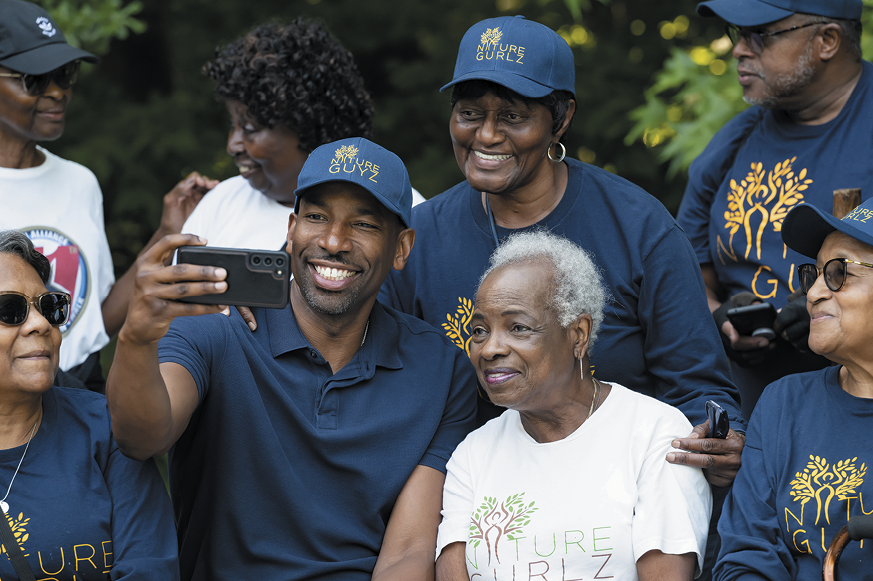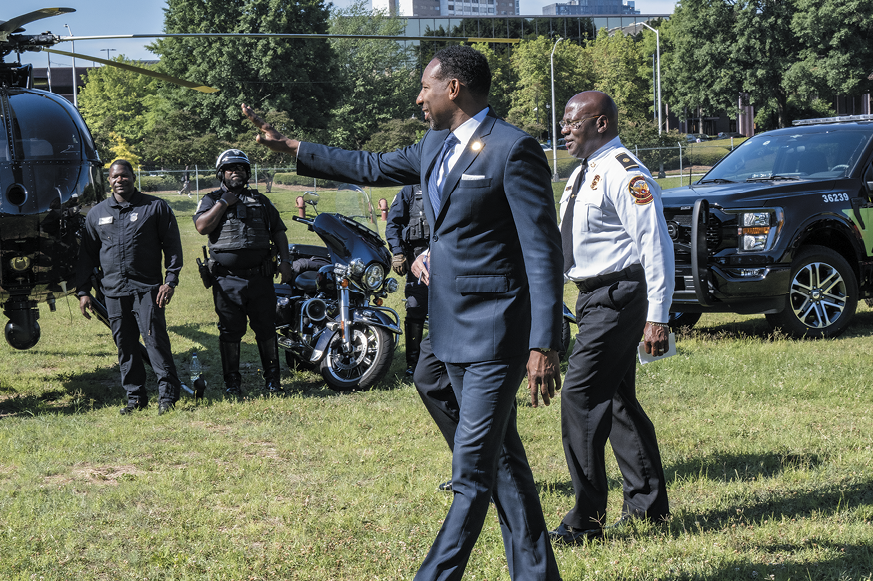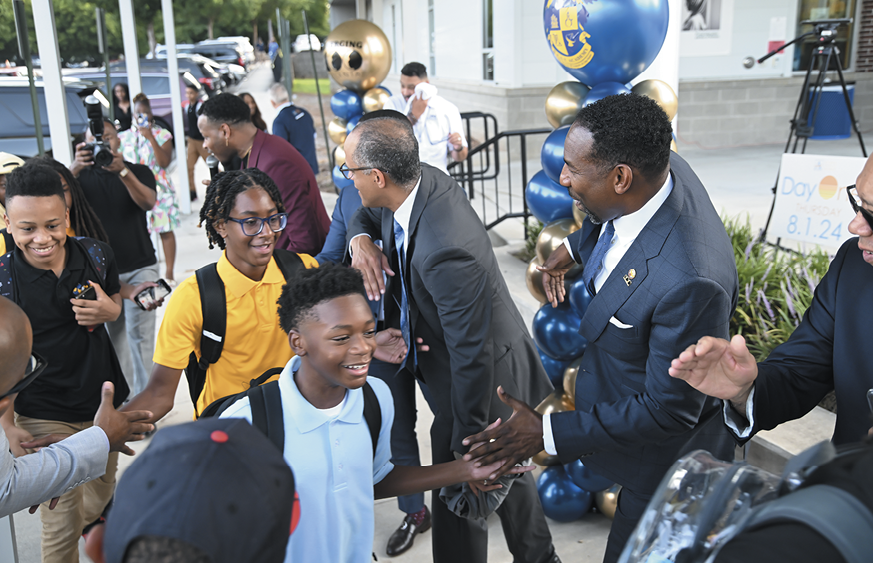- Home
- Media Kit
- MediaJet
- Current Issue
- Past Issues
- Ad Specs-Submission
- Reprints (PDF)
- Photo Specifications (PDF)
- Contact Us
- PRIVACY POLICY
- TERMS OF USE
![]()
ONLINE
![]()
ONLINE

Uniting Atlanta
Editors’ Note
Andre Dickens is the 61st Mayor of Atlanta. A proud native of Atlanta and a product of Atlanta Public Schools, Dickens is focused on bringing opportunity and equity to the city that he loves. Dickens was sworn in as Mayor in January 2022. Prior to his election as Mayor, Dickens served eight years as an at-large City Council member. He was an entrepreneur for over a decade in both the private and nonprofit sectors and a leader in Atlanta’s tech sector. During his time as a City Council member, he served as the Chairman of the Transportation Committee, providing oversight to city streets, bridges, sidewalks, paths, and Hartsfield-Jackson Atlanta International Airport, the world’s busiest airport. Dickens previously served as the Chief Development Officer for TechBridge, a nonprofit that drives community impact by bringing affordable technology and business expertise to other nonprofit organizations. In 2018, he co-founded the Technology Career Program, a free program designed to prepare unemployed and individuals experiencing disadvantage in the work field for a career in the growing technology job market. Dickens also previously served as the Assistant Director of Outreach Initiatives for Georgia Tech’s Office of Institute Diversity. Early in his career, Dickens worked as a sales engineer for DSM Engineering Plastics and became the youngest and first Black salesman of the year. At the age of 28, he co-founded City Living Home Furnishings, which grew into a multi-million-dollar retail business with two locations. Dickens ran the company for nine years until 2011. Dickens has been a member of the Georgia Tech Alumni Board of Directors and is an alumnus of Leadership Atlanta, Diversity Leadership Atlanta, United Way VIP, and Regional Leadership Institute. He is a member of Kappa Alpha Psi, Fraternity, Inc., deacon of New Horizon Baptist Church, and has served on the boards of the Atlanta BeltLine, Invest Atlanta, TechBridge, and the Center for Civil and Human Rights. Dickens is a graduate of Mays High School and holds a bachelor’s degree in chemical engineering from the Georgia Institute of Technology as well as a Master of Public Administration from Georgia State University.

Mayor Dickens joins the Nature Gurlz – a group of
senior women dedicated to promoting physical
and mental health – for a walk at the Cascade Springs
Nature Preserve in Southwest Atlanta
Where did your passion for public service develop?
I am a native of Atlanta and was born when Maynard Jackson was the mayor. He was the first Black mayor of Atlanta and as a young kid, I was able to see what he was doing for Atlanta even though at the time I may not have been able to understand it all. When I was in high school, Andrew Young was the mayor and I watched him advocate for Atlanta as an international city and prioritize the need to invest in our children and our communities. I took it all in and since I was attending Atlanta public schools at that time, I would see Mayor Young’s picture on the wall as I entered school each day and realized how his leadership was impacting my life. I wanted to pursue a path where I could make a difference in the lives of the people of Atlanta.
I knew that Atlanta was special with its civil rights history, and I wanted to be a part of its future. I wanted to serve as mayor of Atlanta from the time I was 16 years old.
Will you discuss the priorities for your administration?
My first focus was on unity, as the city was just coming out of COVID at the time of my inauguration and our residents had a difference of opinion about how government was performing. I wanted to communicate that we were going to be one city with one bright future. Atlanta was a city that was going to be connected, was going to be healthy, and was going to be safe coming out of the pandemic. We wanted to get everyone to participate in government – we were building a group mentality in order to empower upward mobility for every resident in every community.
I have learned in my life, and even more during my time as mayor, that we do not have to be unanimous to be united. There are going to be decisions that people may disagree with, but it is critical for everyone to be engaged in the process to move Atlanta forward.

Mayor Dickens is joined by Atlanta Fire Rescue
Department Chief Rod Smith as he greets
public safety officials at the 2024 Operation
Heatwave Summer Safety press conference
How important has it been for your administration to be transparent in order to build trust with the citizens of Atlanta?
It is paramount because trust in government is not where it needs to be and is way too low. We are more connected now than ever with technology, which is both good and bad. The bad part is that skepticism and negativity have a big microphone with social media, and it is difficult to separate the truth from opinion. This erodes public trust. My mission statement for our administration includes ethical government which is built on integrity and trust, but this needs to be earned every single day.
Will you highlight your administration’s efforts around public safety?
We have been very effective with our public safety efforts. We have used a “whole of government” approach to public safety where every part of government has a role to play, and we have used policing and non-policing programs to drive change. There is no question that throughout the country police went through a difficult time during the social justice movement which was a very necessary movement to have. We had an awakening in this country about police use of excessive force, and it caused many people to leave the profession and new people were not entering the profession. We needed to boost morale in the Atlanta Police Department which we have done with retention bonuses and pay raises. We also started a take-home vehicle program which was a major concern and need for our officers. Officers voiced a desire for a take-home vehicle program, and it doesn’t just benefit the officers – seeing vehicles parked around the community brings people a sense of safety and security. We also created recruit housing so now our recruits have a place to live. Another major change was bringing in a new police chief, Darin Schierbaum, who I believe is the best police chief in the nation. He is a community policing strategist and has done an amazing job of communicating and engaging with our officers and the community.
On the non-policing side, I believed that if we brought down youth-related crime, we would bring down overall crime. We had the year of the youth which made a huge difference. We gave a lot of funding to nonprofits that were servicing our youth in order for them to expand their services and their reach. We also prioritized summer youth employment programs which has grown each summer. This provides our youth with the chance to learn and earn, and keeps them from getting into trouble.

Mayor Dickens joins 100 Black Men of Atlanta, Inc. and
Emerging 100 to welcome students at The B.E.S.T. Academy
on the first day of school in August 2024
How critical has it been for your administration to build a strong public-private partnership in Atlanta?
Atlanta has the fourth highest concentration of Fortune 500 companies in the nation. We have some of the biggest companies headquartered here, and have small and mid-size companies that will be our future leaders. Our business leaders know that they need to play a role in our civic engagement and in our community outcomes – their companies are located in these communities and their employees live in these communities.
We have the Atlanta Committee for Progress (ACP) which was created by Mayor Shirley Franklin in 2003. The ACP’s mission is to provide leadership on key issues important to economic growth and inclusion for all citizens in the City of Atlanta. The ACP provides me the opportunity to gather input and collaborate with C-suite level business, civic, philanthropic, and academic leaders on issues of critical importance to the city. The ACP’s key focus areas have been public sector fiscal accountability; economic development; infrastructure and transportation; K-12 public education; technology and innovation; and culture/quality of life.
With the impact and accomplishments that your administration has achieved for Atlanta, are you able to enjoy the process and celebrate the wins?
I celebrate often, but I do not spike the ball. We still have a lot more to get done, but it is important to take moments to reflect on what you have accomplished and to acknowledge the work of the team.
With the many challenges the country is facing, are you optimistic about the future?
I am an optimist by nature. When you are someone who at the age of 16 wanted to become mayor, and then eventually got there, it takes a lot of belief and optimism. I am a person who rolls up their sleeves and does the work, and with effort comes optimism. If you do not believe in the future being brighter, then you have not assembled the right people around you, or you have not worked hard enough. You need to be a part of creating the future.![]()